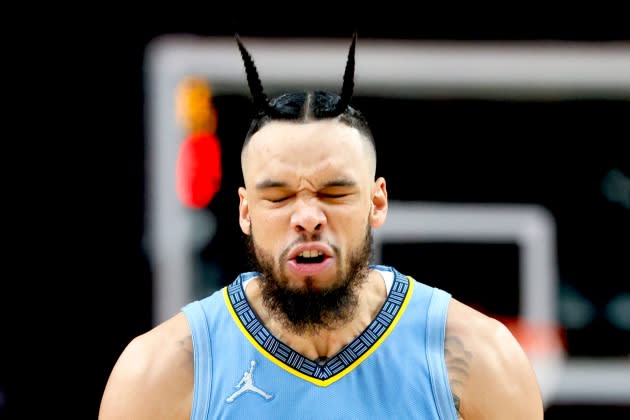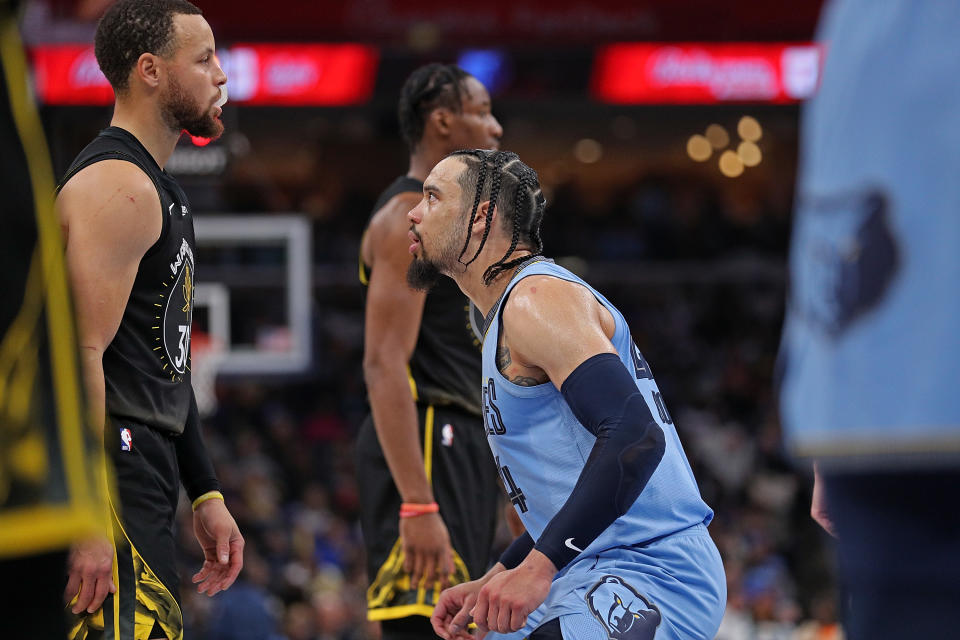How Dillon Brooks Became the NBA’s Supervillain
- Oops!Something went wrong.Please try again later.
- Oops!Something went wrong.Please try again later.
- Oops!Something went wrong.Please try again later.
- Oops!Something went wrong.Please try again later.
- Oops!Something went wrong.Please try again later.

He appears behind tinted glasses, sporting a distressed wool jacket, no undershirt, and a massive gold chain sporting his initials, DB. He has a goatee, manicured to jut out at the chin. A reporter questions him about a heated exchange he had with LeBron James, the best basketball player of his generation, and wonders aloud if it’s wise for him to get into it with a guy who can turn his opponents into ash on a whim. “I don’t care,” he quietly responds, trying to project menace and, well, largely succeeding. “He’s old.” This dismissal feels like tempting fate. “I poke bears,” he adds. It’s hard to tell if he knows that poking bears is unwise. “I don’t respect no one till they come and give me forty.”
Classic Dillon Brooks on his confrontation with LeBron James: “I don’t care. He’s old. … I poke bears. I don’t respect someone until he gives me 40.”
And Brooks had plenty more to say. pic.twitter.com/uWLONrubPZMore from Rolling Stone
— Tim MacMahon (@espn_macmahon) April 20, 2023
It’s a precarious moment for Dillon Brooks. His Memphis Grizzlies’ victory over the Los Angeles Lakers evened up their first round NBA playoff series. A person who reads this article on Sunday, after game three in the series, will watch this clip and see it as either an act of hubris before a spectacular fall at the hands of the King, or a prophecy. We’re at the moment when Doctor Doom points down at Reed Richards, alone and overwhelmed in some obscure corner of spacetime, and yells, “Kneel before Doom!” Only to have Ben, Johnny and Sue break through the cosmic portal and come to his rescue in the next issue, foiling Doom’s plan and leaving him in defeated in a pile of his own indignity.
Sports are not tied to these precepts. Sometimes, villainy triumphs. We really could be looking at the downfall of LeBron James at the hands of a man addressing reporters in garish couture, with chunky jewelry sporting his initials. Or he’s gonna get fifty dropped on him as his squad collapses. One of the two.
“Generally, I’m a fan,” Keith Parish, host of the NBA podcast Fastbreak Breakfast and a Grizzlies fan, offers. “I enjoy it. I find it very entertaining. Although I do feel like it has taken a turn, in recent weeks and months, into more of the wrestling heel territory… I don’t know if it’s right, but I do wish that maybe he wouldn’t straight-up antagonize players who are much better than him.”
In his heart, however, Parish knows that the scorpion cannot change its nature.
To play in the NBA, one must subject themselves to a relentless, all-consuming lifestyle. Forty-one road games a year; practice, drills, and weight-lifting every day; mind-numbing film and scouting sessions; family, friends, employers, and teammates alike all demanding something from you. The money is a motivating factor, of course, but it’s not really enough. To get through the wringer, you need something else: the juice. Some dudes get the juice from interpersonal elements of the game, like friendships and fun. Some dudes go Jekyll and Hyde, studious and committed on the job, a hedonistic man on the town. Some dudes are just fucking competitive in a way a normal person will never quite understand.
“I want them to be angry, off-kilter emotionally. With some guys there’s fear, one hundred percent. They don’t want to talk to me or even look at me,” Brooks explained in an ESPN profile earlier this year. The impression you get is that his persona as an on-court troll is part-tactical, yes, but it’s also deeper than that. The knowledge that he’s gotten under someone’s skin, be it via guarding them within an inch of their life or whacking them in the testicles mid-game, is where Brooks gets the juice.
Draymond Green might do some trolling from time to time, but he’s talking on his podcast, appearing on Inside the NBA, chilling with LeBron. Brooks claims “four or five” NBA friends outside his own squad and growls at reporters. He’s the first guy in a long time who feeds off other people’s bad vibes, drinking in hate like a highly-caffeinated cocktail. No one wanted him here. He was in college for three years at the University of Oregon and went in the second round of the NBA Draft. Brooks is in the NBA as an act of pure spite.
“He was then who he is now,” Sam Whiteley, an Oregon comedian and host of The Payton Years, a podcast about Oregon State Men’s Basketball, says of Brooks. “This is not a recent development. It’s only gotten worse.” I ask Whiteley about his experience watching Brooks as a rival OSU fan. He takes a pause. “A lot of viscera. A lot of curse words. A lot of anger I’m not proud I possess. He’s Draymond-esque in that way that I don’t love how angry he can make me. He is so ugly on the inside and out that he makes those around him uglier.”
I ask Whiteley, who works as a basketball coach, if he thinks Brooks is any good. “That’s part of what’s so fascinating about him,” he replies. “He’s not good enough to act this way but, to answer your question directly, I do think he’s very good. LeBron is not healthy right now, that’s clear, but what he is doing is working to some degree.”
But the psychic toll of Brooks is just too heavy. “I don’t know what salary makes him worth it,” maintains Whiteley. “He’s probably not worth it. I keep comparing him to Draymond. Even subconsciously, I just don’t think there will ever be a dude like that who’s worth it again.”

“I mean… he was the best player on the best team Oregon has had since the 1930s,” explains Erik Gundersen, a sportswriter and Oregon alum who rooted for Brooks when he led the Ducks to the Final Four in 2017.
“Even when he was at Oregon, he would do some things where you’d be like, ‘Damn, this guy is crazy.’ You could tell. He was just maniacal about wanting to win and also he thought he was the best player on those Oregon teams,” he continues. “He wanted to always take the biggest show, to be that guy, and… he was for Oregon. He was always ready to go to war for the Ducks, and to win. There was clearly a screw loose, and also, you kind of needed him. He has a reputation as someone who wanted to trick the referees. In college, guys aren’t doing that that much. But he was always willing to toe the line with the refs and try to get away with stuff. He’s a Machiavellian type of player. The ends justify the means. If you win, it doesn’t matter. That’s what he embodies.”
Gundersen recalls a fond memory of Brooks, when he rolled off a screen against No. 2 UCLA and drilled a three-pointer at the buzzer. He attempts to compare him to Jimmy Butler, though it’s a bit off. Butler is going to the Hall of Fame someday, while this playoff series could end up being the peak of Brooks’ public profile. But they’re both unerringly intense, wide-bodied, and, most importantly, driven by spite and resentment in a way most NBA players, and most people, are not.
Even in the haze of nostalgia for Brooks’ Oregon career, however, Gundersen’s description of Brooks as “Machiavellian” feels apt. The Prince portrays power at its most cynical, brutal, calculating. As a work of philosophy (or satire, depending on your reading), it is unnervingly utilitarian, portraying power and victory as ends unto themselves.
Whiteley speaks to this: “More and more people are becoming aware of something that’s been true for quite a while now. What strikes people about him is that he is just… so unapologetically unredeemable and unlikable in every way that you have to be impressed by it. That’s the closest thing I can come up with as a compliment. That, when that is true of someone, they are capable of mind-blowing things.”
Like Richard Nixon or the Joker, I say.
“Correct. Things that a reasonable human being could not conceivably come up with.”
Would you use the word ‘villain’ to describe him?
“Unfortunately, yes,” Whiteley sighs. “I hate giving him anything that I assume that he wants and the title of ‘villain’ is definitely something he is going for to a truly pathetic degree. But, yes, he is certainly a villain.”
Best of Rolling Stone

